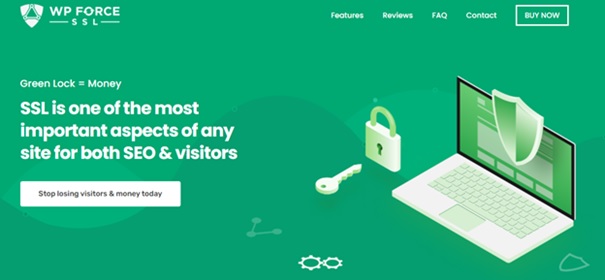SSL HTTPS WooCommerce
Secure Sockets Layer (or SSL) is a technology used for securing transactions between server and browser while securing any information being sent from the browser to the server. SSL uses digital key pairs for authenticating traffic, a public and private key. HTTPS (Hypertext Transfer Protocol Secure) is the primary encrypted protocol for sending data between the web browser and website. On the other hand, HTTP is the same protocol but without security and encryption. The main benefit of HTTPS over HTTP is the prevention of broadcasting website information in a way that is easily accessible by everyone on the internet. Additionally, HTTP protocol makes any communication over public networks very vulnerable. Essentially, HTTPS uses TLS/SSL encryption over the HTTP protocol, verifying that the provider is who they say they are.
In theory, running WooCommerce without an SSL certificate installed is possible. The out-of-the-box version of WooCommerce can run without HTTPS enabled, but it is not recommended. Key benefits of having an SSL certificate include easy encryption of customer data, easy confirmation of domain owners, visitors are more likely to trust the website and make purchases, etc. Also, SSL can help with your website SEO since Google ranks sites with SSL higher. If your WooCommerce store does not have an SSL certificate, you can potentially lose customers.
Additionally, for any WooCommerce store, SSL represents an essential part since a large amount of sensitive customer data is being transmitted for processing orders and purchases. Many payment gateways will not work if you do not have HTTPS protocol enabled. When you enable an SSL certificate on your WooCommerce store, consider displaying your SSL seal, a small verification image that indicates your store is secure. Visual information like this image increases trust from your customers and visitors. In addition to this one, other visual cues like payment icons, padlocks, or further details like your phone number or address, can be added that will add to your store’s legitimacy.
SSL certificates can be obtained for free with some providers or bought via the hosting provider or through some certification authority. Depending on your website needs, you can adopt these free certificates through the Let’s Encrypt certificate authority which fulfills the needs of many website owners. Those who need something more custom, like a wildcard SSL, can be bought through third-party sources like DigiCert, Trustwave, etc.
When choosing those mentioned above, it is good to think about all the work surrounding the SSL certification and maintenance of these certificates. For example, how hard is it to install the certificate, is it easily configurable after the installation, how to keep track of potential errors, is it easy to handle multiple websites, etc.?

For all of the above, WP Force SSL is a great option to consider. WP Force SSL helps users switch to HTTPS traffic, handle, and fix any SSL errors, install certificates, monitor for certificate expiration, etc. The centralized dashboard provides a place where you can control all purchases, sites, and SSL monitors, all from one location. SSL monitoring with a real-time monitor helps keep track of all certificates by monitoring for over 50 possible errors on your websites.
The whole process of certificate installation is made easy for everyone. After logging into your hosting panel and adding the SSL Certificate, WP Force SSL allows you to enable SSL on your website with just one click. The certificate renews automatically every 90 days. All features considered, WP Force SSL is one of the best SSL plugins available for website, especially for WooCommerce.
When installing and enabling an SSL certificate to your WooCommerce store or any website, there are a few options. If you choose a hosting provider that offers a free SSL certificate, the hosting can do the installation part. The second way is to install the SSL certificate yourself if your hosting provider does not offer the option of SSL certificate installation or you want to do it yourself, which is a bit more involving but still achievable. If you opt for the second option of installing it yourself, note that there are tools and plugins like the WP Force SSL plugin which can help you make the process of certificate installation easy. We will keep this one short since there are hundreds of detailed how-to guides for installing SSL certificates to the web server where your website is hosted. First login to your cPanel (suppose you use one) and click on the SSL/TLS Manager option in the Security tab. After that, click on the “Manage SSL Sites” option, open the .crt (certificate) file in a text editor like Notepad, copy the certificate data, including “BEGIN CERTIFICATE” and “END CERTIFICATE” tags, paste the copied text to the “Certificates (CRT)” area, and finally click on the “Install Certificate” button. After obtaining a certificate from Let’s Encrypt, log into your hosting panel, and use the “Add SSL Certificate” or “Add Let’s Encrypt Certificate.”
So, After that enabling the SSL certificate with WP Force SSL is just one click away. The plugin also takes up SSL certificate renewal, which regenerates the certificate every 90 days. When the process is completed, you can go to your website via the browser and verify your URL has the “https://” prefix with the padlock icon on the left. Also, if you try accessing your website using the HTTPs protocol, you will be automatically redirected to the HTTPS version. Keep in mind that for WooCommerce websites, you will probably have to the settings and manually change URLs to point to HTTPS protocol.
All things considered, it is highly recommended to enable SSL and install an SSL certificate to your WooCommerce store or any website for that matter. You will gain trust from potential customers; Google will rank your website higher, hacking attacks less likely to happen, sensitive customer data will be encrypted and secured, etc. These are all benefits worth considering and, ultimately, installing an SSL certificate.

